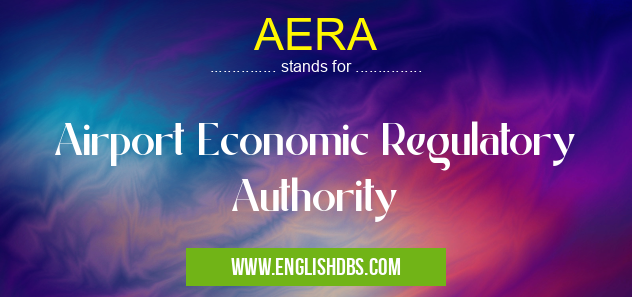What does AERA mean in AUTHORITIES
AERA stands for Airport Economic Regulatory Authority. It is a statutory body established under the Airports Economic Regulatory Authority of India Act, 2008. The primary mandate of AERA is to regulate and monitor the tariffs of airport operators in India, ensuring that they are reasonable and non-discriminatory.

AERA meaning in Authorities in Governmental
AERA mostly used in an acronym Authorities in Category Governmental that means Airport Economic Regulatory Authority
Shorthand: AERA,
Full Form: Airport Economic Regulatory Authority
For more information of "Airport Economic Regulatory Authority", see the section below.
Functions of AERA
- Tariff Regulation: AERA regulates the tariffs charged by airport operators for aeronautical services (such as landing, parking, and navigation) and non-aeronautical services (such as retail, parking, and food & beverage).
- Monitoring Compliance: AERA monitors compliance with its regulations and investigates complaints from stakeholders.
- Dispute Resolution: AERA acts as a mediator in disputes between airport operators and users.
- Advisory Role: AERA provides advice to the Government of India on matters related to airport economic regulation.
Composition of AERA
AERA consists of a Chairperson and four Members, all appointed by the Government of India. The Chairperson is an eminent economist or financial expert, while the Members have expertise in law, finance, and airport management.
Essential Questions and Answers on Airport Economic Regulatory Authority in "GOVERNMENTAL»AUTHORITIES"
What is AERA?
The Airport Economic Regulatory Authority (AERA) is an independent statutory authority established in 1999 to regulate the economic aspects of airport activities in Malaysia. Its primary objective is to ensure the economic efficiency and financial viability of the airport industry while protecting the interests of consumers.
What are the key responsibilities of AERA?
AERA's responsibilities include setting airport charges, regulating airport operators' financial accounts, monitoring airport performance, and ensuring compliance with relevant laws and regulations. It also has the authority to investigate complaints, conduct inquiries, and issue licenses to airport operators.
How does AERA regulate airport charges?
AERA establishes a transparent and consultative process for determining airport charges. It considers various factors, including the airport's operating costs, investment needs, and the level of service provided. AERA's goal is to ensure that airport charges are reasonable and non-discriminatory, while also allowing airport operators to recover their operating costs and generate a reasonable return on investment.
What are the benefits of AERA's regulation?
AERA's regulation contributes to the efficient functioning of the airport industry in Malaysia. It creates a level playing field for airport operators, promotes competition, and ensures that consumers have access to affordable and quality airport services. AERA's oversight also helps protect the interests of the government and taxpayers, as it ensures that airport operators fulfill their obligations and use public funds responsibly.
How can stakeholders participate in AERA's regulatory process?
AERA encourages stakeholders, including airport operators, airlines, consumer groups, and the public, to participate in its regulatory processes. It provides opportunities for stakeholders to provide feedback through public consultations, workshops, and submissions. AERA considers all stakeholder input when making decisions, ensuring that the interests of all parties are represented.
Final Words: AERA plays a crucial role in ensuring the efficient and equitable operation of airports in India. By regulating tariffs and monitoring compliance, AERA helps to promote competition and protect the interests of both airport users and operators.
AERA also stands for: |
|
| All stands for AERA |
